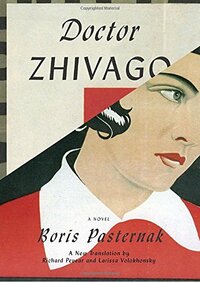Take a photo of a barcode or cover
I made it about 2/5 of the way through before having enough. Pasternak is so full of himself it's nauseating to read. His characters are devoid of personality and act only as mouthpieces for him to eschew his thoughts on art (which are always contradictory), religion (if only the Jews were Christian then they wouldn't suffer so much), and politics (both sides are bad and everyone I disagree with is an incompetent amoral fool and oppression gives people character, damnit!)
Stick to poetry, Pasternak.
Stick to poetry, Pasternak.
Elk jaar rond kerst of op oudjaarsavond kijk ik de miniserie uit 2002 of de film, zo ook weer in 2023. Ik wilde echter ook het boek weer lezen, als een oude vriend waar ik de geliefde scenes met plezier herlees.
Although this took me nearly a month to read, it is probably one of my favorites now. Fairly easy to follow, but man this book is depressing.. in a good way.
... The edition of the book has the incorrect page # and publisher. This edition has 653 pages and is published by Vintage International.
... The edition of the book has the incorrect page # and publisher. This edition has 653 pages and is published by Vintage International.
My first Russian book!! Picked it up bc Russia was constantly in the news and then they actually invaded Ukraine, so wish things didn’t pan out like that. Enjoyable novel equal parts tragic story of Yury and historical background of Russia in the 1900s.
adventurous
emotional
sad
medium-paced
"Doctor Zhivago" contains a treasury of achingly beautiful passages on love, the individual, philosophy and religion.
The romance between Yury and Lara obtains a near spiritual quality as the last individuals under a harsh regime of "unity and equality" find fleeting solace together.
The mystical is laced throughout this novel in the form of unexpected coincidence, elevating the novel beyond pure reality and into a realm of symbolism, everything becoming imbued with meaning.
While not all of the characters and resolutions of plotline hold up to close scrutiny, the power and clarity with which the themes are conveyed is near transcendental.
In the words of Boris Pasternak's cousin Olga Freidenberg who had recently been sent the book and asked for feedback: "what do I think of it? What do I think of life? This if life in its greatest and broadest sense"
The romance between Yury and Lara obtains a near spiritual quality as the last individuals under a harsh regime of "unity and equality" find fleeting solace together.
The mystical is laced throughout this novel in the form of unexpected coincidence, elevating the novel beyond pure reality and into a realm of symbolism, everything becoming imbued with meaning.
While not all of the characters and resolutions of plotline hold up to close scrutiny, the power and clarity with which the themes are conveyed is near transcendental.
In the words of Boris Pasternak's cousin Olga Freidenberg who had recently been sent the book and asked for feedback: "what do I think of it? What do I think of life? This if life in its greatest and broadest sense"
I liked him more than Crime & Punishment, and less than War & Peace/Anna Karenina. The translation I read (sadly didn't remember to write down who did it) was really really really wonderful, and the writing is beautiful -- but the plot didn't impress me so much. This is a sinful analogy, but Dr. Zhivago : War & Peace :: Babel : Traffic.
I didn't like this book enough to actually read quite 1/2 of it. The context and Yuri's poetry were interesting, but the writing style, most characters and general plot bored me. I feel like Pasternak should have stuck with poetry writing.
This belongs in the great tradition of revolutionary and wartime fiction alongside the likes of The Tale of Two Cities and War and Peace.
What got Pasternak in trouble with this book is that it presents a humanist view of the Russian Revolution and its impact on a middle class doctor/poet from Moscow. The project of the Soviet Union, so the thinking went in the USSR, should be viewed from the perspective of human epochs. The rise of proletariat, according to a certain kind of thinking, was an inevitable and permanent change for the better for humankind.
Of course, the trouble with that as we well know -- not just through the heavily-filtered Western propagandist's perspective during the Cold War, but with the benefit of hindsight decades later -- is that the experience on the individual human level was almost uniformly awful. And that's what Doctor Zhivago is -- a perspective from the human vantage point.
As a medical professional, the titular Doctor Zhivago is part of the privileged merchant middle class under the Czars. He has a liberal bend to his philosophy well before the revolution, served his country in the military, and is an all-around pretty cool dude. But when the wave of the revolution hits, disorder and famine sets in, ultimately yielding to a civil war and power consolidation, Zhivago's life gets twist-turned upside down.
His family tries to make due with diminished circumstances in Moscow before deciding to pursue an almost utopian vision of living off the land in the country's relatively untamed eastern portion. This succeeds for a while before the civil war rolls over and he is conscripted in the partisan forces and his family is basically permanently severed.
There is way more to it in the 700+ pages, obviously, including a cast of characters that recurs throughout Zhivago's life, a doomed love affair that spins of bittersweet moments, and many unsolved mysteries (what the heck drove Zhivago's father to suicide?) to chew on over several readings.
I think the strongest thread I was able to pull out of this well-wrought tale though was that philosophy and ideology are great in theory, but often produced monstrous results when applied to reality. As an idealist myself, I think I often succumb to the idea that if only everybody listened to my common sense ideas, so many of the world's problems would be solved!
But the real world does not bow to the logic and pure forms that populate our minds. Politics is not philosophy, it's a negotiation between powerful factions. People are fallible and hypocritical and selfish and don't always behave in a way that's rational. So no bit of high-minded political rhetoric is going to be warped into something much different and dangerous by reality and circumstance.
That doesn't mean necessarily that the ideas behind a project like the Soviet Union are in some way flawed and evil. It just means that trying to convert a region that has largely been dominated by autocrats into a system genuinely governed by small Soviets of citizens is inevitably going to snap back to its natural form. In this case, autocracy where everybody calls everyone else comrade.
And even if that political form had come out all roses from the societal perspective, it's still going to make many lives much worse than they were before, like for our friend Doctor Zhivago, flawed human being that he is.
I can understand why the Soviet Union didn't like the book, but I also think that many Americans wouldn't like the message either... which is really, don't buy the propaganda, do what you have to do to preserve the health and safety of you and yours. Or your mistress, you know, whatever.
What got Pasternak in trouble with this book is that it presents a humanist view of the Russian Revolution and its impact on a middle class doctor/poet from Moscow. The project of the Soviet Union, so the thinking went in the USSR, should be viewed from the perspective of human epochs. The rise of proletariat, according to a certain kind of thinking, was an inevitable and permanent change for the better for humankind.
Of course, the trouble with that as we well know -- not just through the heavily-filtered Western propagandist's perspective during the Cold War, but with the benefit of hindsight decades later -- is that the experience on the individual human level was almost uniformly awful. And that's what Doctor Zhivago is -- a perspective from the human vantage point.
As a medical professional, the titular Doctor Zhivago is part of the privileged merchant middle class under the Czars. He has a liberal bend to his philosophy well before the revolution, served his country in the military, and is an all-around pretty cool dude. But when the wave of the revolution hits, disorder and famine sets in, ultimately yielding to a civil war and power consolidation, Zhivago's life gets twist-turned upside down.
His family tries to make due with diminished circumstances in Moscow before deciding to pursue an almost utopian vision of living off the land in the country's relatively untamed eastern portion. This succeeds for a while before the civil war rolls over and he is conscripted in the partisan forces and his family is basically permanently severed.
There is way more to it in the 700+ pages, obviously, including a cast of characters that recurs throughout Zhivago's life, a doomed love affair that spins of bittersweet moments, and many unsolved mysteries (what the heck drove Zhivago's father to suicide?) to chew on over several readings.
I think the strongest thread I was able to pull out of this well-wrought tale though was that philosophy and ideology are great in theory, but often produced monstrous results when applied to reality. As an idealist myself, I think I often succumb to the idea that if only everybody listened to my common sense ideas, so many of the world's problems would be solved!
But the real world does not bow to the logic and pure forms that populate our minds. Politics is not philosophy, it's a negotiation between powerful factions. People are fallible and hypocritical and selfish and don't always behave in a way that's rational. So no bit of high-minded political rhetoric is going to be warped into something much different and dangerous by reality and circumstance.
That doesn't mean necessarily that the ideas behind a project like the Soviet Union are in some way flawed and evil. It just means that trying to convert a region that has largely been dominated by autocrats into a system genuinely governed by small Soviets of citizens is inevitably going to snap back to its natural form. In this case, autocracy where everybody calls everyone else comrade.
And even if that political form had come out all roses from the societal perspective, it's still going to make many lives much worse than they were before, like for our friend Doctor Zhivago, flawed human being that he is.
I can understand why the Soviet Union didn't like the book, but I also think that many Americans wouldn't like the message either... which is really, don't buy the propaganda, do what you have to do to preserve the health and safety of you and yours. Or your mistress, you know, whatever.




